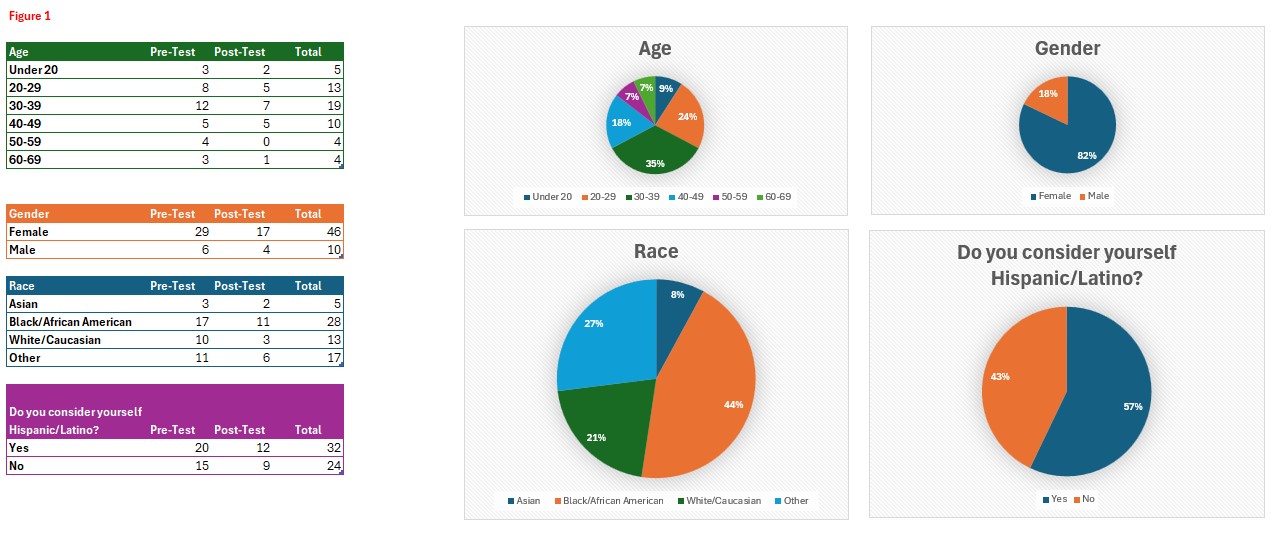Session Information
Date: Monday, October 27, 2025
Title: Abstracts: ARP I: Multidimensional Influences on Health in SLE (1686–1691)
Session Type: Abstract Session
Session Time: 3:45PM-4:00PM
Background/Purpose: SLE is a life-threatening autoimmune disease that disproportionately affects African American (AA), Hispanic/Latino, & Asian populations. These communities experience serious health disparities, including more severe illness & poorer health outcomes. Research highlights that perceived racial discrimination in healthcare is a major concern among SLE patients, particularly among AA patients, contributes to lower trust in physicians, treatment adherence, & worsened health outcomes. A hospital-based support & education program conducted a survey to identify lupus patients’ self-reported experiences with perceived discrimination & healthcare navigation.
Methods: A pre/post-test survey, including validated scales such as the Everyday Discrimination Scale (EDS) was disseminated online to lupus patients participating in monthly support group sessions. The survey assessed key areas, including disease activity, experiences of discrimination, & patient-provider communication. A pre-test was administered at the beginning of the year, followed by 6 virtual support group meetings that provided education on recognizing & intervening when discrimination occurs in healthcare settings.
Results: A total of 37 participants completed the pre-test, and 23 completed the post-test (n=56). Most respondents (82%) identified as female. The racial breakdown included 44% Black/AA, 21% White, 57% identifying as Hispanic/Latino, 27% identifying as other races, and 8% Asian. There was a notable concentration of respondents aged 30–39 (35%). (See Figure 1)
Using the criteria that responses other than “Never” indicate a discriminatory experience, analysis of the EDS revealed a decrease (â) in reported discrimination experiences from pre-test to post-test. Participants who reported being treated with less courtesy â by 24.3%, while reports of being treated with less respect â by 11.6%. Perceived poorer service âby 10% and reports of feeling that a doctor or nurse acted superior â by 6.5%.
However, some areas saw slight increase (á): participants reporting that a doctor or nurse did not listen á by 5.9%, and those perceiving that a healthcare provider believed they were not smart á by 4.3%. (See figure 2)
Conclusion: Despite limitations, this study affirms that tailored education & peer support can meaningfully reduce perceived discrimination and strengthen patient empowerment in lupus. Participants reported greater awareness, improved communication with providers, & enhanced healthcare navigation skills. These findings highlight the benefit of incorporating equity-driven, patient-centered programs into clinical & community settings to build trust, promote self-advocacy, & advance health equity for individuals living with SLE.
To cite this abstract in AMA style:
Cabrera K, Calvache P, Mendez L, Morales G, Rose-Smith J. Addressing Perceived Discrimination in Lupus Care: Enhancing Patient Empowerment and Health Equity Through Education and Support [abstract]. Arthritis Rheumatol. 2025; 77 (suppl 9). https://acrabstracts.org/abstract/addressing-perceived-discrimination-in-lupus-care-enhancing-patient-empowerment-and-health-equity-through-education-and-support/. Accessed .« Back to ACR Convergence 2025
ACR Meeting Abstracts - https://acrabstracts.org/abstract/addressing-perceived-discrimination-in-lupus-care-enhancing-patient-empowerment-and-health-equity-through-education-and-support/


.jpg)